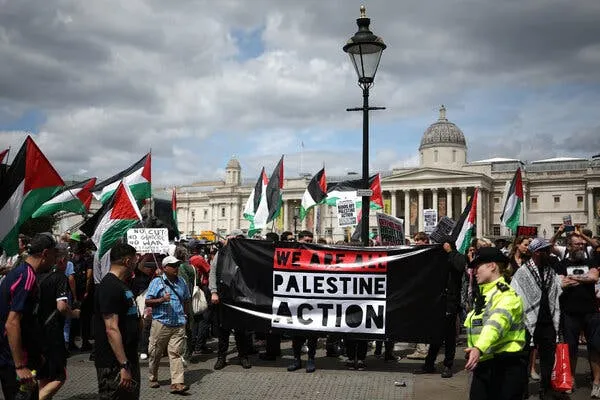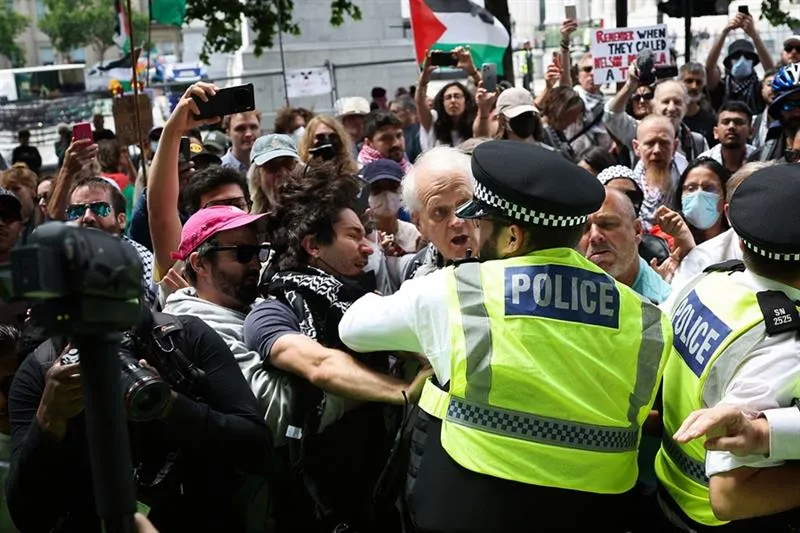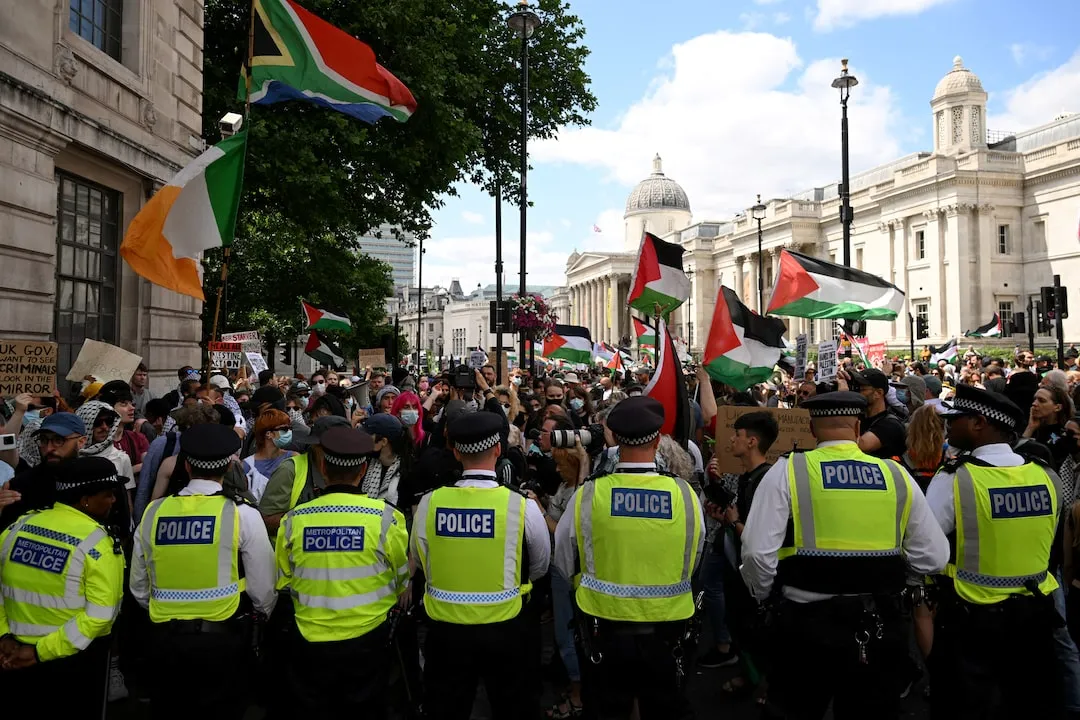In 2025, a landmark legal case in the United Kingdom is raising alarm bells across political, human rights, and activist circles. A UK court is currently evaluating whether the direct action group Palestine Action, known for its protests against UK arms exports to Israel, could be legally classified as a terrorist organization under the Terrorism Act 2000.
This unprecedented move has sparked intense debate: Where is the line between activism and terrorism? Is the UK criminalizing protest, or upholding national security? And what precedent could this set for future dissent in democratic societies?
Let’s break down the facts, background, and implications of this pivotal case.
Who Is Palestine Action?
Palestine Action is a direct-action protest network formed in 2020. The organization specifically targets Elbit Systems UK, a division of Israel’s biggest weapons manufacturer, and other UK-based armaments manufacturers. Palestine Action alleges these firms are complicit in war crimes due to their role in supplying weapons used in Israeli military operations in Gaza and the West Bank.
Tactics used by the group include:
- Occupying and damaging factory premises
- Defacing buildings with red paint (symbolizing blood)
- Scaling rooftops and disrupting business operations
- Spray-painting government buildings and consulates
Palestine Action openly embraces civil disobedience as a form of protest and sees their actions as necessary to disrupt what they describe as the UK’s “complicity in genocide.”

The Case: Activism or Terrorism?
The current legal case centers on several members of Palestine Action who have been charged with:
- Criminal damage
- Trespassing
- Conspiracy to commit offenses under terrorism laws
But the controversial element lies in how the Crown Prosecution Service (CPS), at the request of counterterrorism units, has framed the group’s actions within the scope of the Terrorism Act 2000. Specifically, authorities are exploring whether the group’s methods amount to acts intended to influence the government and intimidate the public for political ends, a key clause in the definition of terrorism under UK law.
If accepted by the courts, this would mean that non-lethal, politically motivated property damage—a hallmark of direct action—could fall under anti-terrorism statutes.
Legal Definitions Under Scrutiny
According to the Terrorism Act of 2000, terrorism is the use of force or threat of force intended to:
- Influence the government or intimidate the public
- Advance a political, religious, or ideological cause
- involve severe property damage or violent acts directed at a person.
Palestine Action’s defense argues that while their protests have caused property damage, they do not involve violence against individuals, threats to public safety, or acts designed to spread fear among the general population.
Critics of the case argue that expanding the definition of terrorism to include non-violent activism would have chilling effects on free speech, civil disobedience, and political protest.
The Political Context: Why Now?
The timing of the case is significant. It comes amid heightened global scrutiny of Israel’s military operations in Gaza, following months of intense bombardment and civilian casualties. Massive pro-Palestinian protests have erupted across UK cities, demanding the government sever arms trade ties with Israel.
In parallel, right-wing politicians and media figures have been calling for tougher penalties on “extremist” protest groups, including climate activists (like Just Stop Oil) and pro-Palestinian demonstrators. The UK government has also proposed new legislation that expands police powers to curb protests deemed “disruptive.”
Within this environment, branding Palestine Action as a terrorist group could be seen as part of a broader trend to suppress dissenting voices, particularly those critical of UK foreign policy and the defense industry.

Voices of Support and Opposition
Supporters of Palestine Action argue:
- The group targets weapons manufacturers, not civilians.
- Their aim is justice, not terror—to end complicity in war crimes.
- Civil disobedience is a legitimate form of protest, especially when legal channels are ineffective.
- Branding them as terrorists would be legally dangerous and politically motivated.
Prominent human rights organizations, including Amnesty International and Liberty, have expressed concerns over the case. “Using terrorism legislation to silence activists is authoritarian and incompatible with democratic norms,” said one legal advisor affiliated with Liberty.
Opponents and government officials counter:
- Disruptive protest that causes major property damage and economic harm must face serious legal consequences.
- Some actions by Palestine Action are calculated to intimidate workers, breach national security, and promote political instability.
- Applying terrorism laws is a matter of ensuring national safety, not stifling dissent.
The UK Home Office, while not commenting directly on the case, has reiterated that “extremism of any form, including political violence, will not be tolerated.”
Implications of a Terrorism Label
If the court rules in favor of categorizing Palestine Action’s behavior as terrorism, the consequences would be far-reaching:
- Activists could face longer prison sentences, restricted bail rights, and financial investigations.
- The group’s funding, communication, and support networks could be monitored, frozen, or dismantled.
- Other protest movements—environmental, labor, anti-racist—may fear similar treatment.
- The case could redefine terrorism law in the UK, creating a precedent where direct action = terrorism.
This has led legal experts to warn of a slippery slope, where the line between protest and extremism becomes dangerously blurred.
The Role of the Public and Media
The case has captured significant public attention, especially on social media. Hashtags like #StopCriminalisingProtest, #FreePalestine, and #PalestineAction are trending, with thousands voicing solidarity and concern.
Media coverage is divided. Some outlets frame Palestine Action as reckless saboteurs who endanger national interests, while others portray them as courageous whistleblowers standing against war profiteering.
The case is apparently being closely watched by international observers, including the UN Special Rapporteur on Human Rights and Counter-Terrorism.
Related Blog: AI and Power: How Tech Is Reshaping Global Politics
What Comes Next?
The court’s ruling, which is anticipated in the upcoming weeks, may:
- Uphold traditional protest protections and reaffirm civil liberties
- Or set a new, controversial precedent for prosecuting activists under terrorism laws
Whatever the verdict, the outcome will have lasting effects—not only for Palestine Action but for the future of protest, democracy, and civil resistance in the UK.
As debates over war, peace, and justice intensify globally, how we define and respond to activism at home will shape the very fabric of democratic engagement.
Final Thought:
When a state begins to confuse political protest with terrorism, the line between democracy and authoritarianism becomes dangerously thin. The UK court now faces not just a legal challenge, but a test of its democratic values.




